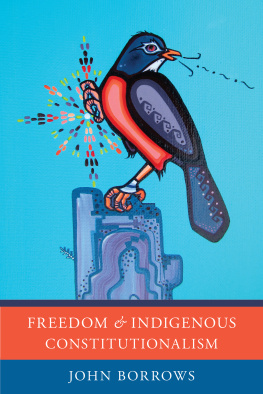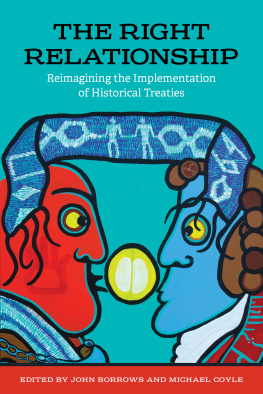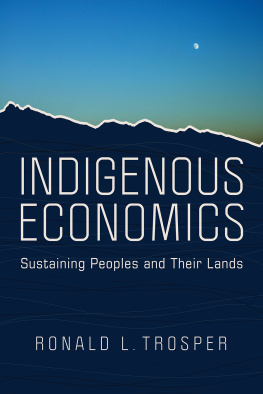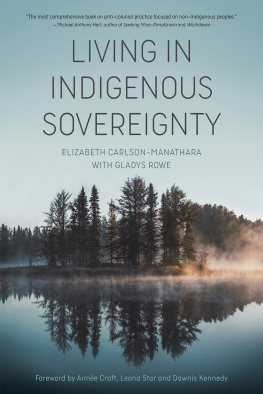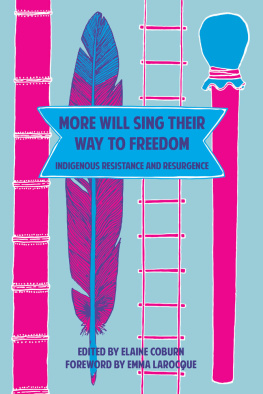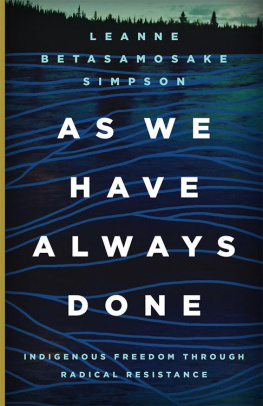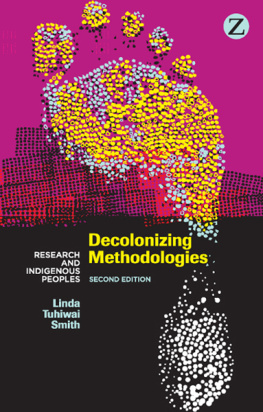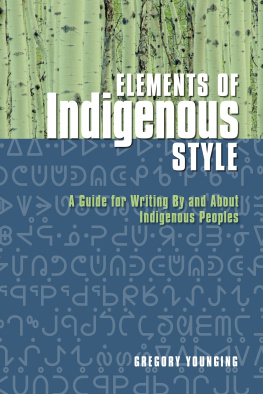John Borrows - Freedom and Indigenous Constitutionalism
Here you can read online John Borrows - Freedom and Indigenous Constitutionalism full text of the book (entire story) in english for free. Download pdf and epub, get meaning, cover and reviews about this ebook. year: 2016, publisher: University of Toronto Press, genre: Politics. Description of the work, (preface) as well as reviews are available. Best literature library LitArk.com created for fans of good reading and offers a wide selection of genres:
Romance novel
Science fiction
Adventure
Detective
Science
History
Home and family
Prose
Art
Politics
Computer
Non-fiction
Religion
Business
Children
Humor
Choose a favorite category and find really read worthwhile books. Enjoy immersion in the world of imagination, feel the emotions of the characters or learn something new for yourself, make an fascinating discovery.
- Book:Freedom and Indigenous Constitutionalism
- Author:
- Publisher:University of Toronto Press
- Genre:
- Year:2016
- Rating:3 / 5
- Favourites:Add to favourites
- Your mark:
- 60
- 1
- 2
- 3
- 4
- 5
Freedom and Indigenous Constitutionalism: summary, description and annotation
We offer to read an annotation, description, summary or preface (depends on what the author of the book "Freedom and Indigenous Constitutionalism" wrote himself). If you haven't found the necessary information about the book — write in the comments, we will try to find it.
John Borrows uses Ojibwe law, stories, and principles to suggest alternative ways in which Indigenous peoples can work to enhance freedom.
Freedom and Indigenous Constitutionalism — read online for free the complete book (whole text) full work
Below is the text of the book, divided by pages. System saving the place of the last page read, allows you to conveniently read the book "Freedom and Indigenous Constitutionalism" online for free, without having to search again every time where you left off. Put a bookmark, and you can go to the page where you finished reading at any time.
Font size:
Interval:
Bookmark:
Indigenous traditions can be uplifting, positive, and liberating forces when they are connected to living systems of thought and practice. Problems arise when they are treated as timeless models of unchanging truth that require unwavering deference and unquestioning obedience. Freedom and Indigenous Constitutionalism celebrates the emancipatory potential of Indigenous traditions, considers their value as the basis for good laws and good lives, and critiques the failure of Canadian constitutional traditions to recognize their significance.
Demonstrating how Canadas constitutional structures marginalize Indigenous peoples ability to exercise power in the real world, John Borrows uses Ojibwe law, stories, and principles to suggest alternative ways in which Indigenous peoples can work to enhance freedom. Among the stimulating issues he approaches are the democratic potential of civil disobedience, the hazards of applying originalism rather than living-tree jurisprudence in the interpretation of Aboriginal and treaty rights, American legislative actions that could also animate Indigenous self-determination in Canada, and the opportunity for Indigenous governmental action to address violence against women.
JOHN BORROWS is the Canada Research Chair in Indigenous Law in the Faculty of Law at the University of Victoria and is the winner of both the Canadian Political Science Associations Donald Smiley Prize (for Recovering Canada)and the Canadian Law and Society Association Book Prize (for Canadas Indigenous Constitution).
JOHN BORROWS
UNIVERSITY OF TORONTO PRESS
Toronto Buffalo London
University of Toronto Press 2016
Toronto Buffalo London
www.utppublishing.com
Printed in Canada
ISBN 978-1-4426-3093-2 (cloth) ISBN 978-1-4426-2923-3 (paper)
 Printed on acid-free, 100% post-consumer recycled paper with vegetable-based inks.
Printed on acid-free, 100% post-consumer recycled paper with vegetable-based inks.
Library and Archives Canada Cataloguing in Publication
Borrows, John, 1963, author
Freedom and indigenous constitutionalism / John Borrows.
Includes bibliographical references and index.
ISBN 978-1-4426-3093-2 (cloth). ISBN 978-1-4426-2923-3 (paper)
1. Native peoples Legal status, laws, etc. Canada. 2. Native peoples Canada Politics and government. 3. Native peoples Civil rights Canada. 4. Ojibwa law. I. Title.
KE7709.B6738 2016 342.7108'72 C2016-900084-2
KF8205.B6738 2016
University of Toronto Press acknowledges the financial assistance to its publishing program of the Canada Council for the Arts and the Ontario Arts Council, an agency of the Government of Ontario.

This book was crafted in stages. The first phase was written in response to invitations for contributions to the literature, and these texts were published through edited academic collections and government inquiries. These works were also published as separate pieces. During each phase, I planned many trips home to speak with my family and friends. At these times, I read large portions of this manuscript to my mother, father, sister, and daughter. My purpose was to seek a synthesis of these various ideas. While encouraging me, they also identified major weaknesses in my arguments.
The next stages of my preparation took me to a remote cabin at Neyaashiinigmiing, on the Cape Croker Indian Reserve in Southern Ontario. The cabin in which I worked was solar powered. I was off the grid. There was no phone, Internet, or television. These distractions were a world away. In the peace of that setting I rewrote, amended, and substantially added to my earlier materials while weaving an overall thematic structure through them. It was a productive time. Outside my door, the snow melted in the deep bush. Small rivers soon flowed across the land. When the thaw abated, it wasnt long before three-flower trilliums blanketed the forest floor. In turn, the air quickly filled with music. Birds returned from their southern journeys, and insects emerged from their sleep. Skunks, raccoons, and porcupines wandered past my door, peering through the screens, curious about their visitor. Chipmunks chastised me for my presence. Bears awoke from their long hibernation, making their appearance along the shore. It was an inspiring time. Through the suns power and my cabins solar panels my computer kept working, and so did I.
When I returned from the reserve, I put the book aside. I wanted to see if it would pass a small test of time. I taught at Victoria, Minnesota, and Princeton and gave speeches on parts of the book at Dalhousie, Concordia, Osgoode Hall Law School, Simon Fraser University, and the Universities of Toronto, Manitoba, Chicago-Kent, Calgary, British Columbia, Ottawa, and Western Ontario. I am grateful for the comments I received in these venues. They revealed further gaps in my thinking, which I have tried to address in this version of my work.
Over ten years have passed since this project began. While the errors are all mine, I have many people to thank for their help in this books preparation, including Hannah Askew, Ben Berger, Jean Borrows, Jennifer Borrows, Joseph Borrows, Lindsay Borrows, Gillian Calder, Jamie Cameron, Brenda Child, Gordon Christie, Hamar Foster, Hadley Friedland, Robert Gibbs, Shin Imai, Darlene Johnston, Rebecca Johnston, Sonia Lawrence, Johnny Mack, Patrick Macklem, Kent McNeil, J.R. Miller, Aaron Mills, Val Napoleon, Kent Roach, Douglas Sanderson, Kerry Sloan, Emily Snyder, Richard Spearman, Heidi Stark, James Tully, Mark Walters, and David Wilkins. I have also greatly benefited from supportive colleagues at the Law Schools of the University of Victoria and University of Minnesota. Dean Andrew Petter, Dean Donna Greschner, Dean Jeremy Webber, and Dean David Wippman all encouraged me as a writer, and ensured that I had sufficient support to complete this book. Lastly, I thank my wife, Kim, for her unfailing encouragement and support. She lives the themes discussed in this book: freedom, goodness, mobility, civility, acceptance, and constructive critique. She is my best friend, and this work would not be possible without her.
In my view, there is no timeless trait, characteristic, custom, or idea that is categorically fundamental to being Indigenous. The categories of Mikmaq, Abenaki, Cree, Haudenosaunee, Anishinaabe, Assiniboine, Dakota, Secwepmec, Salish, Nuu-Chah-Nuulth, Gitksan, Tlingit, Haida, Dene, Metis, Inuit, etc., are all context-dependent classifications. They are political, social, legal, linguistic, and/or cultural facts that are fluid and subject to change through time. Indigeneity does not necessarily reside in any particular blood, language, land, culture, clan, family grouping, spiritual practice, economic activity, story, teaching, song, relationship, etc. though these criteria are very important components of belonging in particular contexts. It is misleading to claim that Indigenous societies possess an unalterable central essence or core. This is what I label false tradition. While each category looks and feels relatively stable from the inside, if measured by short-term (centuries-long) metrics, changes in society, which may be gradual, can produce dramatic shifts over the longer term. This book considers conceptions of tradition rooted in fundamentalist views about the immutable nature of Indigenous people and their societies. False notions of traditions can be held by anyone. While national governments, courts, and the media often characterize Indigenous peoples by reference to conceptual cores and integral characteristics, Indigenous peoples can also fall into this trap. The challenges such views present to freedom and a good life, especially as they are deployed in the law, is a major focus of this work.
Font size:
Interval:
Bookmark:
Similar books «Freedom and Indigenous Constitutionalism»
Look at similar books to Freedom and Indigenous Constitutionalism. We have selected literature similar in name and meaning in the hope of providing readers with more options to find new, interesting, not yet read works.
Discussion, reviews of the book Freedom and Indigenous Constitutionalism and just readers' own opinions. Leave your comments, write what you think about the work, its meaning or the main characters. Specify what exactly you liked and what you didn't like, and why you think so.

